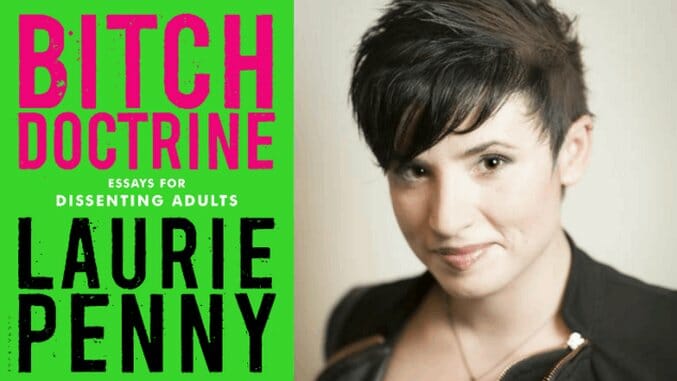Laurie Penny Talks Bitch Doctrine, Her Essay Collection for Dissenting Adults

Laurie Penny has made a name for herself with her empathetic yet unapologetically radical writing. Far from the contrarian left where all that isn’t perfect is unacceptable, Penny carves out spaces for discussing the biggest issues of our time—all with her eye on progress and an unflinching dedication to helping marginalized communities. So her latest book, Bitch Doctrine: Essays for Dissenting Adults, couldn’t have come at a better time. With the very forces Penny fights against on the rise, her essay collection connects the dots between identity, politics, economic struggle and the patriarchy.
“You cannot separate issues of gender and identity from issues of political and economic struggle,” the journalist and activist says in a phone interview with Paste. “They are the same struggle.”
Bitch Doctrine proves vital at a time when the President of the United States has spent his first months in office rolling back protections for women, people of color, the LGBTQ+ community and other marginalized groups. But Penny says the book had already been completed when Trump was elected, and she’d envisioned the book being published under President Clinton. Although she did make edits, including rewriting the introduction and adding a few articles about Trump’s election, the bulk of the book remained unchanged.
“The body of the essays—on gender, free speech, abortion rights—are the same,” Penny says. It’s the way in which they are framed by recent events that is different from how she imagined. Penny originally thought the collection would be read in the context of a liberal, historic, female presidency. That didn’t happen, but her points are still important for markedly different reasons. “The arguments are no different. The enemy is different.”
To be clear, that enemy is not simply Donald Trump. The essays, which cover everything from free speech to the HBO show Girls to Penny’s gender identity (and what that means for her work as a public-facing feminist), are aimed at forces far more deeply imbedded in our culture and politics than Trump. Instead, Penny sees Trump as the unavoidable face of society’s much larger issues, like patriarchy and consumer capitalism.
“Trump is a symptom,” she says. “He didn’t come from nowhere, but he makes the crisis feel acute rather than chronic.” What Trump has done, however, is galvanize and rally those who oppose the things he represents. “You aren’t just seeing people mobilize against Trump. You’re seeing people bring new momentum to [social, political and environmental movements].”
If the title is any indication, Bitch Doctrine isn’t a collection that hems and haws. The opening paragraph lays it out: “This is a book about the hard stuff, about the painful places where theory crashes into flesh and bone…about desire and control and contested bodies…about gender and power and violence…” Embracing “bitch” isn’t new—Penny herself calls back to the now iconic Tina Fey line, “Bitches get stuff done.” But under a Trump presidency, that reclamation is about speaking up in distinctly hostile circumstances.
“It’s the job of people who work directly in politics to make compromises and to work out what can be clawed back from an anti-woman agenda,” Penny says. “But at times when the world is turning darker and there are more conservative forces in power is exactly the moment when activists and political writers should be more radical, not less.”
-

-

-

-

-

-

-

-

-

-

-

-

-

-

-

-

-

-

-

-

-

-

-

-

-

-

-

-

-

-

-

-

-

-

-

-

-

-

-

-








































